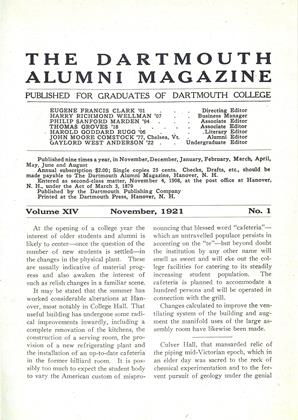Dartmouth Night, the most distinctive tradition of the College, was fittingly celebrated Friday evening, Oct. 7, with inspiring exercises in the big tent on the campus, attended by approximately 3000 undergraduates, alumni, and members of the community. President Ernest Martin Hopkins presided, and introduced the speakers.
The most important statement of the evening was contained in the introductory remarks of President' Hopkins, who announced the College enrollment to be past the 2000 mark—a total of 2014, divided into 284 seniors, 449 juniors, 589 sophomores, 604 freshmen, and 88 graduate students.
Prior to the assembly in the tent, the customary parade around the dormitories and past the home of President Hopkins was made, the College Band leading the way. The Band, in conjunction with the Glee Club, also furnished music at the exercises in the tent.
In prefacing his opening remarks, President Hopkins took occasion to read telegrams from several prominent alumni of the College, notable among them being United States Senator George H. Moses of New Hampshire, ex-President William Jewett Tucker and Mr. Edward Tuck, noted benefactor of the College.
President Hopkins then proceeded with his formal welcome to the members of the freshman class, urging them to take advantage of the many advantages that Dartmouth offers, particularly those of climate and environment. In part he said: "Intellectual attainments, intensive culture and selfcenteredness, with the desire for mental self-betterment, are all highly desirable attributes but they have destroyed civilizations from earliest times when massed exclusive of the appreciation of the value of toiling, sweating, struggling and even fighting humanity. In short, whenever a people, as I have said before, get to the point where their physical struggle is over and they apparently have the time and opportunity to become intellectual, they become, instead, futile and non-productive even, eventually, within their chosen field." President Hopkins called attention to the statement that men: of outstanding achievements had developed under vicissitudes of climate.
The next speaker, Jackson L. Cannell '19, varsity football coach, dwelt briefly on the discouragements and disappointments that are a necessary part of freshman year, and urged the new men to make a strong fight against these influences, and thus to prove their worthiness of being successors to the generations preceding.
William N. Rogers '15, of Concord, N. H., a prominent alumnus in the state, best known through his role as leader of the Democratic party in the legislature, was the third speaker of the evening. He mentioned the labor and devotion spent in the building of the College and reminded the freshmen of the challenge that the history of the past brings to them.
Thomas L. Cotton '17, Brooklyn, N. Y., football star while in College, and during the past few years connected with student relief in Russia, took occasion to remind the freshmen of the advantages of the education offered 'them at Dartmouth. He exhorted them to make the most out of their opportunities, and then to share their benefits with less fortunate peoples of the world.
The last speaker, Professor Emeritus E. J. Bartlett '72, more familiarly and afifectionately known as "Bubby" Bartlett, struck a responsive chord in the hearts of his audience with his references to the past history of Dartmouth, and the responsibilities that the traditions of the College make incumbent upon the present generation to uphold.
Coincidental with the exercises in Hanover, Dartmouth Night celebrations were held all over the country, and many telegrams were received by President Hopkins extending to the College the felicitations of the alumni on the occasion of the great annua'! reunion.
 View Full Issue
View Full Issue
More From This Issue
-
 Article
ArticleTHE UNDERGRADUATE'S RELATIONSHIP TO THE COLLEGE
November 1921 By ERNEST MARTIN HOPKINS -
 Article
ArticleAt the opening of a college year the
November 1921 -
 Sports
SportsFOOTBALL
November 1921 -
 Article
ArticleTWO DISTINGUISHED VERMONT ALUMNI
November 1921 By JAMES FAIRBANKS COLBY '72 -
 Article
ArticleMEMORIAL FIELD FAST BECOMING A REALITY
November 1921 -
 Class Notes
Class NotesCLASS OF 1905
November 1921 By Fletcher Hale
Article
-
 Article
ArticleALUMNI FUND CONTRIBUTIONS BY CLASSES
November 1918 -
 Article
ArticleDARTMOUTH ALUMNI CONTRIBUTE TO WASHINGTON STADIUM FUND
January 1922 -
 Article
ArticlePres. Dickey To Visit Eight Alumni Clubs
March 1951 -
 Article
ArticleAdministrative Staff Changes
OCTOBER 1967 -
 Article
ArticleGrant Standbrook Named Varsity Hockey Coach
MAY 1970 -
 Article
ArticleA Family Tree Rooted in History
SEPTEMBER 1985 By Peggy Sadler


